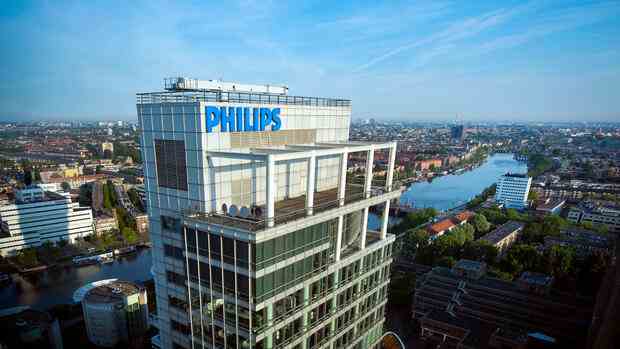From the savings and productivity increases, the company expects to be able to increase its operating margin (Ebitda margin) to a low double-digit percentage by 2025. From 2025, Philips wants to achieve values between 15 and 20 percent. In the past financial year, the margin fell to 7.4 percent due to the recall, but also to supply bottlenecks, compared to twelve percent in the previous year.
The company had closed the fourth quarter of the difficult year 2022 better than expected. Sales rose from October to December by three percent to 5.4 billion euros, said Philips. The operating profit adjusted for special effects increased slightly to 651 million euros. The fourth quarter is traditionally the company’s strongest.
Philips CEO Jakobs wants to improve the group’s performance
On the stock exchange, Philips shares rose by more than eight percent on Monday morning. However, analysts at the Swiss bank UBS assume that the positive mood among investors will only be short-lived – due to the low level of orders and the still unclear legal outcome of the recall.
Top jobs of the day
Find the best jobs now and
be notified by email.
Jakobs succeeded long-time CEO Frans van Houten in October and, in addition to downsizing, promised to significantly increase the company’s productivity.
Jakobs specified his plans for this on Monday. He wants to transfer responsibility for the supply chains back to the business units, which the group had bundled centrally in recent years. In addition, Jakobs wants to reduce the number of currently more than 5,000 suppliers and streamline the organization. In research and development, Philips wants to concentrate on fewer, larger and higher-quality projects.
Jakobs is planning this year with sales growth in the low single digits. Due to falling demand, the company is expecting a rather weak start to the year, and business should recover over the course of the year. Philips expects an adjusted EBITA margin in the upper single-digit percentage range. As in the previous year, the dividend should be 0.85 cents, but will be paid out in shares.
The forecast does not include possible burdens from the recall of more than five million ventilators since June 2021. Jakobs cannot yet quantify what costs the group will face as a result of comparisons and the more than 100 class action lawsuits in the USA alone.
In the affected ventilators, Philips processed an insulating foam from which particles that may be hazardous to health are released. According to its own statements, Philips has meanwhile examined 68 percent of the devices complained about. According to an interim report published in December, it is unlikely that particle emissions would have a significant impact on health if devices were properly cleaned.
Philips shares lose more than 60 percent of their value
Philips stock has lost more than 60 percent of its value since the recall was announced, and around 47 percent in the past 12 months alone. In the meantime, Philips has produced 90 percent of the products to be exchanged, the company said.
>> Also read: New product warning from Philips
In addition to the recall and bottlenecks in the supply chain, the lockdowns in China caused by Covid-19 had also placed a heavy burden on Philips last year. The sales of the medical technology group fell by three percent to 17.8 billion euros. The bottom line is that Philips posted a loss of almost 1.53 billion euros, mainly due to non-cash adjustments to goodwill.
Jakobs has been CEO of Philips since October 2022, having previously held various positions at the company since 2010. Most recently, he was responsible for the “Connected Care” area, which includes devices for diagnostics and the evaluation of medical data – including the management of the recall of the ventilators.
With a recent turnover of 4.4 billion euros, Connected Care is Philips’ second-largest business area. The largest, with annual sales of almost 9.2 billion euros, is the Diagnosis & Treatment division, which includes imaging processes such as ultrasound and computer tomography. Here, Philips competes primarily with the Dax group Siemens Healthineers and the recently split-off health division of the US group General Electric. The third-largest division of Philips is the Personal Care division, which includes electric toothbrushes and baby products.
More: GE Healthcare wants to take market share from its German rival

